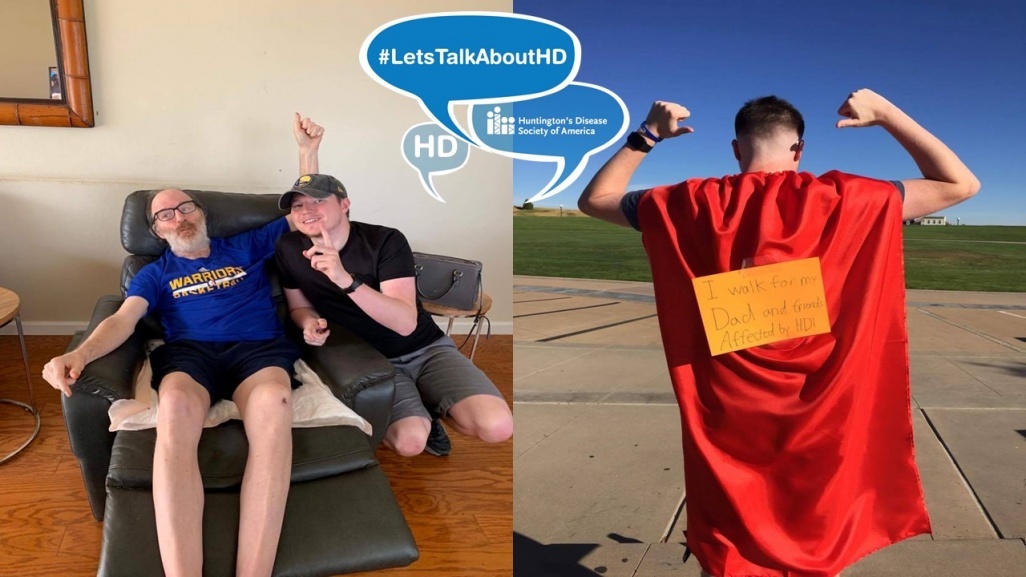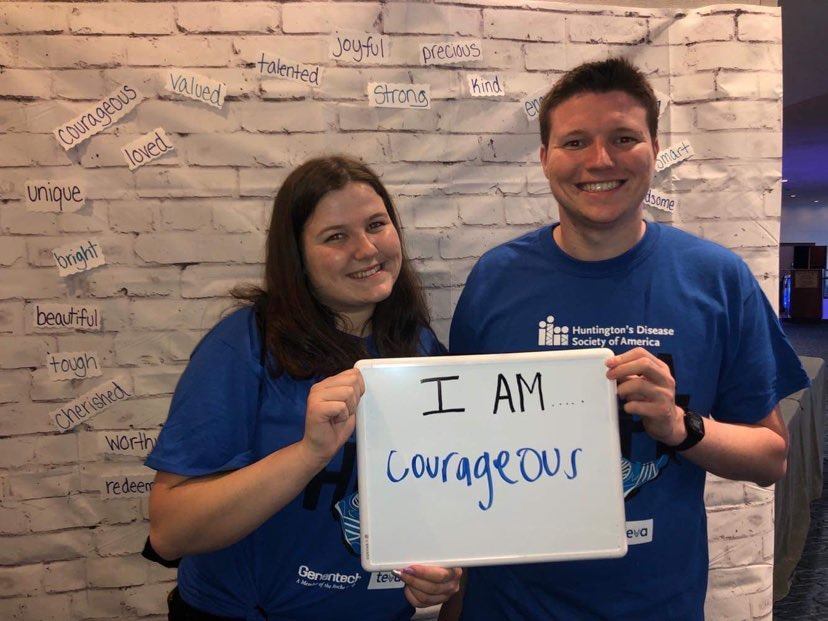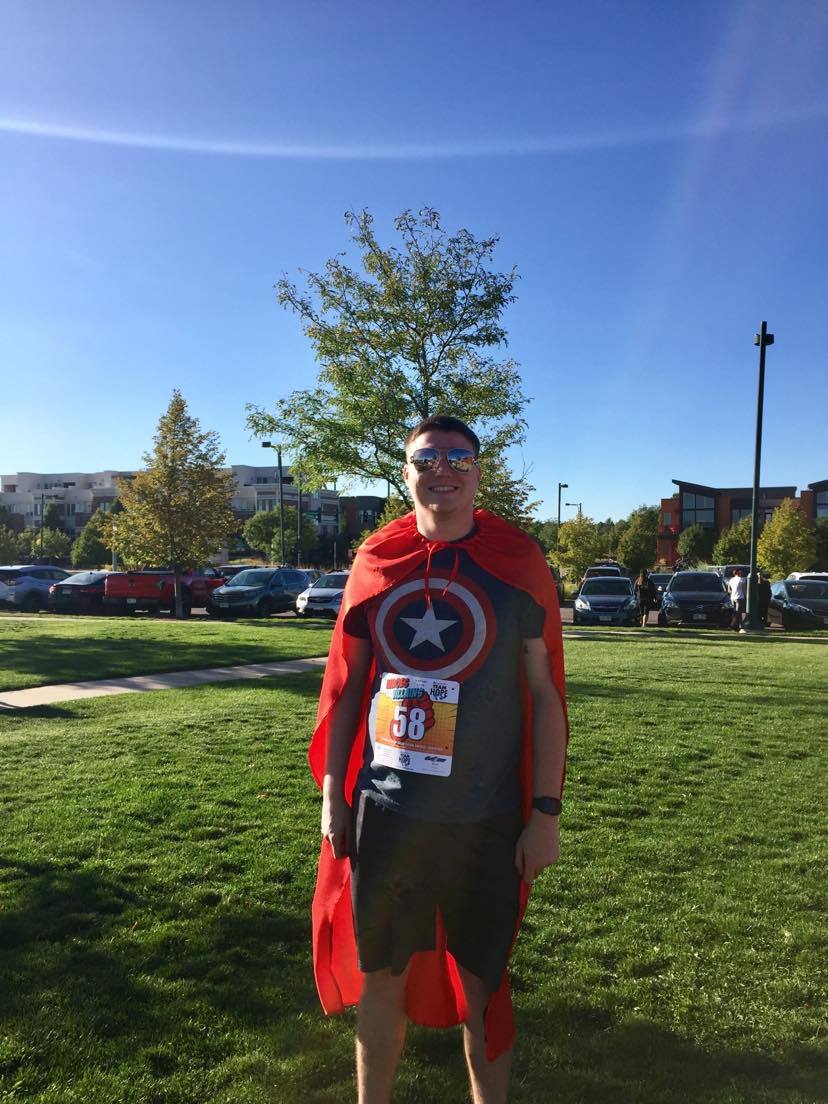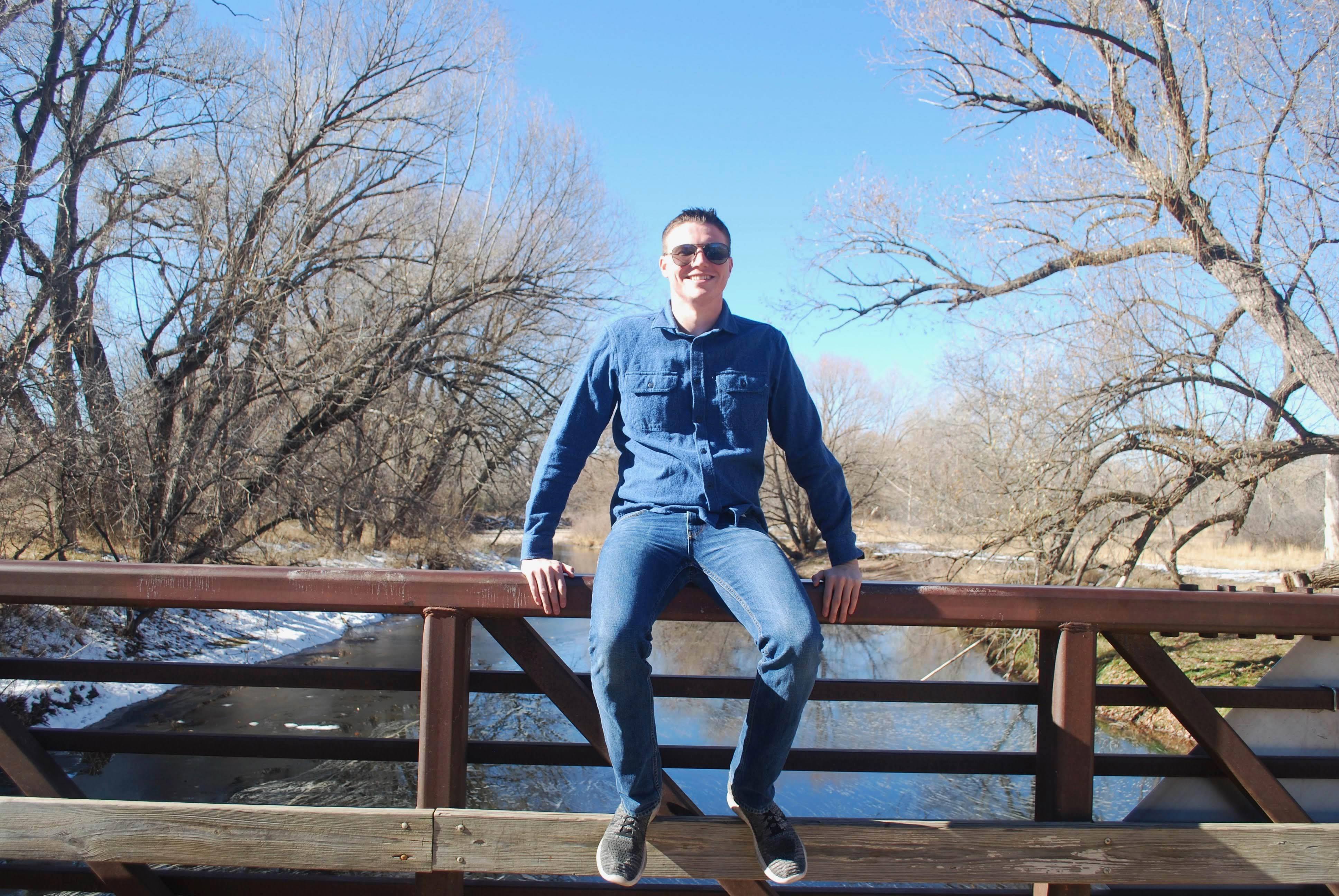
By Matthew Santamaria (msantamaria@hdsa.org)
Growing up in California, Huntington’s disease (HD) has always been apart of Collin Harrington’s life. His late father was the carrier of the HD gene.
HD is a fatal genetic disorder that causes the progressive breakdown of nerve cells in the brain. It deteriorates a person’s physical and mental abilities usually during their prime working years and has no cure.
“I did not realize how much it affected me until I was in high school and learned more about it,” said Collin.
In 2016, Collin started to become more involved in the HD Community. He started to go to youth camps and it helped him create amazing bonds and friendships. It showed that he is not alone in this battle.
He and his sister, Kendall, are also members of HDSA’s National Youth Alliance (NYA). Established nearly twenty years ago, the HDSA NYA is HDSA’s nationwide youth program providing support, services and community to children, teens, and young adults affected by HD. With regional retreats, youth social workers and an annual event at the HDSA National Convention, the NYA is the most experienced youth support program for the HD community.

To learn more about Kendall’s story, click here
As Collin got older, he started to think more about his future.
“After a few years, I started to contemplate to get tested or not. I always wanted to but had no reason to,” Collin explains. “When I started thinking about having a life and wanting children, I decided to test so I could figure out my life.”
The decision to get genetically tested is difficult to make. Each year, 5-10% are tested. It is never the right or wrong decision to be tested. There are people that see no benefit in knowing that they will develop the disease while others want to know in order to make informed choices about their future. It can take up to several weeks to receive your results from the genetic testing center.
In the summer of 2019, before HDSA’s 34th National Convention, Collin now lives in Colorado going to college where he made an appointment at the Rocky Mountain Movement Disorders Clinic (ROMC). This is one of the 50 HDSA Centers of Excellence that provide an elite team approach to HD care and research. Professionals have extensive experience working with families affected by HD and work together to provide families the best HD care program.
“I felt confident that testing was the right thing for me to do,” said Collin. “When I went into the clinic a month later, the medical professionals were amazing, made me feel welcomed, and were helpful with any questions I may have had. They made sure I was ready to go through with this and I knew I was ready.”
It would take six weeks for the results to come back. For Collin, it felt like an eternity as he was trying to keep himself occupied and try not to think about it.
“I had to occupy myself by work, hiking, and just living my life as best as I could,” Collin explains. “I was nervous as anyone would, but I knew I would be ready for my results good or bad.”
In 2019, on August 19th, Collin went to the clinic alongside his girlfriend, Jorden, and best friend, Katie. They all found out that Collin tested negative for the gene that causes HD.

“I couldn’t believe it,” said Collin. “I was stunned, excited, felt free. I decided to go mini golfing to go celebrate. I eventually told my family who all felt huge sighs of relief for me, especially my mom. However, I told myself that my work for HD will never end until a cure is found, whether my results were negative or positive.”
The excitement would not last. A few months later, his father passed away due to HD complications. According to Collin, he was sad but also relieved because he was not sick anymore. At the funeral, Collin shared his fondest memories of his father.

###
Huntington’s disease is a fatal genetic disorder that causes the progressive breakdown of nerve cells in the brain. It deteriorates a person’s physical and mental abilities usually during their prime working years and has no cure. Every child of a parent with HD has a 50/50 chance of inheriting the faulty gene that causes Huntington’s disease. Today, there are approximately 41,000 symptomatic Americans and 200,000 at-risk of inheriting the disease. In less than 10% of cases, juvenile Huntington’s disease (JHD) affects children & adolescents. JHD usually has a more rapid progression rate than adult onset HD; the earlier the onset, the faster JHD progresses. HD is described as having ALS, Parkinson’s and Alzheimer’s diseases – simultaneously. HD is characterized by a triad of symptoms, including progressive motor dysfunction, behavioral disturbance and cognitive decline.
The Huntington’s Disease Society of America is the premier nonprofit organization dedicated to improving the lives of everyone affected by HD. From community services and education to advocacy and research, HDSA is the world’s leader in providing help for today and hope for tomorrow for people with HD and their families.
To learn more about Huntington’s disease and the work of the Huntington’s Disease Society of America, visit www.HDSA.org or call 1(800)345-HDSA.
This is a story featuring a personal experience with Huntington’s disease. If you would like to have your story told please contact Matthew Santamaria at msantamaria@hdsa.org
Growing up in California, Huntington’s disease (HD) has always been apart of Collin Harrington’s life. His late father was the carrier of the HD gene.
HD is a fatal genetic disorder that causes the progressive breakdown of nerve cells in the brain. It deteriorates a person’s physical and mental abilities usually during their prime working years and has no cure.
“I did not realize how much it affected me until I was in high school and learned more about it,” said Collin.
In 2016, Collin started to become more involved in the HD Community. He started to go to youth camps and it helped him create amazing bonds and friendships. It showed that he is not alone in this battle.
He and his sister, Kendall, are also members of HDSA’s National Youth Alliance (NYA). Established nearly twenty years ago, the HDSA NYA is HDSA’s nationwide youth program providing support, services and community to children, teens, and young adults affected by HD. With regional retreats, youth social workers and an annual event at the HDSA National Convention, the NYA is the most experienced youth support program for the HD community.

To learn more about Kendall’s story, click here
As Collin got older, he started to think more about his future.
“After a few years, I started to contemplate to get tested or not. I always wanted to but had no reason to,” Collin explains. “When I started thinking about having a life and wanting children, I decided to test so I could figure out my life.”
The decision to get genetically tested is difficult to make. Each year, 5-10% are tested. It is never the right or wrong decision to be tested. There are people that see no benefit in knowing that they will develop the disease while others want to know in order to make informed choices about their future. It can take up to several weeks to receive your results from the genetic testing center.
In the summer of 2019, before HDSA’s 34th National Convention, Collin now lives in Colorado going to college where he made an appointment at the Rocky Mountain Movement Disorders Clinic (ROMC). This is one of the 50 HDSA Centers of Excellence that provide an elite team approach to HD care and research. Professionals have extensive experience working with families affected by HD and work together to provide families the best HD care program.
“I felt confident that testing was the right thing for me to do,” said Collin. “When I went into the clinic a month later, the medical professionals were amazing, made me feel welcomed, and were helpful with any questions I may have had. They made sure I was ready to go through with this and I knew I was ready.”
It would take six weeks for the results to come back. For Collin, it felt like an eternity as he was trying to keep himself occupied and try not to think about it.
“I had to occupy myself by work, hiking, and just living my life as best as I could,” Collin explains. “I was nervous as anyone would, but I knew I would be ready for my results good or bad.”
In 2019, on August 19th, Collin went to the clinic alongside his girlfriend, Jorden, and best friend, Katie. They all found out that Collin tested negative for the gene that causes HD.

“I couldn’t believe it,” said Collin. “I was stunned, excited, felt free. I decided to go mini golfing to go celebrate. I eventually told my family who all felt huge sighs of relief for me, especially my mom. However, I told myself that my work for HD will never end until a cure is found, whether my results were negative or positive.”
The excitement would not last. A few months later, his father passed away due to HD complications. According to Collin, he was sad but also relieved because he was not sick anymore. At the funeral, Collin shared his fondest memories of his father.

Collin has a message for the HD Community:
“I know he will always be there for me. His death helped encouraged me to live life to the fullest and to continue my work with the HD community for those who did not get the same results as I did. My work will never finish, my support will never go away until this is eradicated, and we can all live without the fear of HD. Let us find a cure for HD as one big family. Together we can eradicate HD. All love.”
“I know he will always be there for me. His death helped encouraged me to live life to the fullest and to continue my work with the HD community for those who did not get the same results as I did. My work will never finish, my support will never go away until this is eradicated, and we can all live without the fear of HD. Let us find a cure for HD as one big family. Together we can eradicate HD. All love.”
###
Huntington’s disease is a fatal genetic disorder that causes the progressive breakdown of nerve cells in the brain. It deteriorates a person’s physical and mental abilities usually during their prime working years and has no cure. Every child of a parent with HD has a 50/50 chance of inheriting the faulty gene that causes Huntington’s disease. Today, there are approximately 41,000 symptomatic Americans and 200,000 at-risk of inheriting the disease. In less than 10% of cases, juvenile Huntington’s disease (JHD) affects children & adolescents. JHD usually has a more rapid progression rate than adult onset HD; the earlier the onset, the faster JHD progresses. HD is described as having ALS, Parkinson’s and Alzheimer’s diseases – simultaneously. HD is characterized by a triad of symptoms, including progressive motor dysfunction, behavioral disturbance and cognitive decline.
The Huntington’s Disease Society of America is the premier nonprofit organization dedicated to improving the lives of everyone affected by HD. From community services and education to advocacy and research, HDSA is the world’s leader in providing help for today and hope for tomorrow for people with HD and their families.
To learn more about Huntington’s disease and the work of the Huntington’s Disease Society of America, visit www.HDSA.org or call 1(800)345-HDSA.
This is a story featuring a personal experience with Huntington’s disease. If you would like to have your story told please contact Matthew Santamaria at msantamaria@hdsa.org
